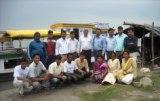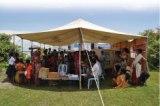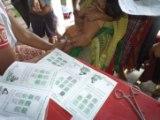Archives
Hope floats in valley of floods
About ten per cent of Assam’s population numbering over 30 lakh live in numerous isles of the mighty Brahmaputra River far from the mainland in the valley. The river is the only way to reach them. Healthcare facility, education and other basic amenities are a far cry for these communities living in isolated river islands. There are around 2500 sandbar island villages along the entire stretch of the Brahmaputra River from Sadiya in the east to Dhubri in western Assam, inhabited by people from different roots. It is the Mising tribe who live in raised houses built on stilts, that dominates the island population in eastern Assam. Bodos, some Assamese speaking communities, Bengalis and Bihari are the other settlers in these eastern islands where agriculture and diary are the primary sources of livelihood. Downstream of the river, from Sonitpur to Dhubri people belonging to the religious minority population are the dominant inhabitants of these river islands also called ‘chars’.
The boat clinic programme is being run in Assam by the Centre for North East Studies and Policy Research (C-NES) with financial support from the National Rural Health Mission (NRHM) in coordination with Government of Assam to reach out to these island dwellers.
As of today, the Boat Clinic program is operating in 13 districts of Assam through 15 independent units. The program is rendering medical services to the isolated island communities along the Brahmaputra River. Each of the boat clinics are manned by staffs of 15 members including doctors, laboratory technicians and nurses. The idea was a brainchild of noted writer-journalist Sanjoy Hazarika, the managing trustee of the C-NES. The programme aims at providing healthcare especially to the mothers and the children apart from curative and preventive healthcare so as to reduce Maternal Mortality Rate (MMR), Infant Mortality Rate (IMR) & Total Fertility Rate (TFR) in the State which is amongst the highest in India.
 According to figures mentioned in a socio economic survey report of the char areas of Assam 2003, the 13 districts where boat clinics are operating have 2091 char villages with a population of 22.7 lakhs. Dhubri district has the highest number of chars with a population of 6.8 lakhs. Brahmaputra River transports suspended sediment load of about 1.84 billion tons per year, which is the world’s highest. The course of the river keeps on shifting as it deposits the huge load of sediments along its course forming numerous land masses or islands which are known as chars or chaporis.
According to figures mentioned in a socio economic survey report of the char areas of Assam 2003, the 13 districts where boat clinics are operating have 2091 char villages with a population of 22.7 lakhs. Dhubri district has the highest number of chars with a population of 6.8 lakhs. Brahmaputra River transports suspended sediment load of about 1.84 billion tons per year, which is the world’s highest. The course of the river keeps on shifting as it deposits the huge load of sediments along its course forming numerous land masses or islands which are known as chars or chaporis.
The C-NES won the World Bank’s India Marketplace 2004 competition for this unique innovative concept that was construed to be potent enough to transform lives of rural communities. With the award money a boat named ‘Akha’ (Hope) was designed and built involving local experts from Dhola in Sadiya in Assam under the supervision of a boat builder from Dibrugarh within eight months. The wooden boat, 65 feet in length and 15 feet in width has space for an OPD, laboratory, cabins for doctors and nurses, kitchen, toilets, water supply, a generator set and is powered by a 120 bhp Tata engine.
The D-Day came on May 25th, 2005 when ‘Akha’ set sail from Maijan Ghat in Dibrugarh to Bogibeel area along with a medical team from Dibrugrah district health department on national immunization day to reach out to under privileged island dwellers. These islands have hardly any presence of Government and basic amenities like health, education, sanitation etc.
| Taking note of the success of the boat clinic programme, the North Eastern Council (NEC) has sponsored a `4 crore project of a Hospital Ship (floating hospital) to be implemented by the C-NES. |
As ‘Akha’ has raised hopes for improving the health of the forgotten island dwellers it induced some oil and tea companies to extend help towards the venture along with the Dibrugarh district health and administration departments. In July 2006, UNICEF came forward to support ‘Akha’s’ Dibrugarh health outreach initiative with focus on improving immunization coverage of children and pregnant women. According to a source in the C-NES, the success of the ‘Akha’ initiative was taken note of by Assam Government and in the year 2007 the National Rural Health Mission (NRHM), Government of Assam (GoA), has shown interest to expand the programme to reach out to a much larger section of the population of river island dwellers across the valley.
On 1st February 2008 the first MoU under Public Private Partnership (PPP) mode was signed between C-NES and the NRHM, GoA, to launch a boat clinic programme covering river islands in the districts of Dhemaji, Tinsukia, Morigaon, Dhubri & Dibrugarh, with financial assistance from the NRHM.
As per the MoU, the implementing partner C-NES is required to arrange for boats to run those floating health clinics. An economist of repute, Swaminathan Aiyar came forward to donate funds to C-NES to build boats that are meant to take healthcare facility to lakhs of unreached island dwellers in the Assam valley.
 A C-NES official said that so far, three boats have been constructed with donations from Mr. Aiyar and those are now sustaining boat clinic programmes in Tinsukia, Dhemaji and Dhubri districts while a fourth boat is under construction for deployment in Morigaon district. The boats operating in Tinsukia, Dhemaji and Dhubri are named Swaminathan, Shahnaz and Rustom respectively while the one for Morigaon will be named Pallabi. The Indian Oil Corporation had sponsored SB Nahor for Jorhat and Numaligarh Refinery has sponsored SB Numali for Sonitpur boat clinic projects under their corporate social responsibility (CSR) programmes.
A C-NES official said that so far, three boats have been constructed with donations from Mr. Aiyar and those are now sustaining boat clinic programmes in Tinsukia, Dhemaji and Dhubri districts while a fourth boat is under construction for deployment in Morigaon district. The boats operating in Tinsukia, Dhemaji and Dhubri are named Swaminathan, Shahnaz and Rustom respectively while the one for Morigaon will be named Pallabi. The Indian Oil Corporation had sponsored SB Nahor for Jorhat and Numaligarh Refinery has sponsored SB Numali for Sonitpur boat clinic projects under their corporate social responsibility (CSR) programmes.
The partnership with NRHM was further augmented in 2009 & 2010 leading to the introduction of 10 more boat clinic units at Lakhimpur, Jorhat, Sonitpur, Nalbari, Barpeta, Kamrup, Goalpara, Bongaiaon and one additional unit each in Dhubri and Barpeta.
Boat clinic teams in specially designed boats like ‘Akha’ go on trips of 4-6 days at a stretch conducting 1 or 2 camps per day. Where such bigger boats are not available country boats are hired and modified to make a health clinic that provides for basic provisions including an OPD and a cabin for ANC checkup. Each boat clinic unit has a district office which is headed by a District Program Officer (DPO). The DPO coordinates with the district health society and the targeted communities for smooth implementation of the program along with the medical officers and supporting clinical staff. The Programme Management Units (PMUs) at Guwahati and New Delhi keep tabs and guide operations on the ground.
The ASHA workers and the AWW workers are actively involved in the program. Village Health & Sanitation Communities (VHSC) wherever active are also involved in the program. Yearly target and monthly plan of action is prepared in consultation with the district health department taking care that the immunization schedule is not disturbed.
| In July 2006, UNICEF came forward to support ‘Akha’s’ Dibrugarh health outreach initiative with focus on improving immunization coverage of children and pregnant women. |
Medicines and vaccines are supplied by the Joint Director of Health Services through the district drug stores as per the indent. Close coordination is maintained with the district NRHM unit. On camp days the boat clinic teams carry with them medicines, reagents, vaccines, food and drinking water.
Information about health camp date is sent to the targeted villages well in advance by boat clinic community workers through the ASHA or the village headmen. These camps elicit huge response from island dwellers as they have no alternative healthcare option. Over ten lakh such people have benefitted from this boat clinic programme in Assam as per an estimate made by the C-NES. Health camps are normally conducted under tents erected on the banks by the side of the boats. The teams have to travel miles carrying medicines and other equipment to camp sites during winter season when the boat has to be docked far away because of the low water level of the river. In some districts a tractor trailer or a horse cart is hired to carry tents, medicines, vaccines, other equipment and staff to the actual campsite from the boat. The camps have a systematic arrangement of space for each individual, doctors with their tables for health checkups, nurses for immunization, laboratory technicians for tests like Hb, ABO, HCG etc, and a pharmacy for dispensing medicine, CW with registration and a special area for ANC if the boat is not in close proximity.
Till March 31st, 2012 Boat Clinics have conducted 7803 health camps with 6,31,646 health checkups, 74,066 routine immunisations, 32,779 ANC, 8,116 PNC, 28,112 Vitamin A, 11,748 special vaccination, 6,716 IPPI, and 1,65,445 family planning item distribution.
 The efforts of boat clinic programme have been instrumental in removing superstitions among illiterate island dwellers which had made them resist interventions like immunization of children, use of IFA tablet by pregnant women, adoption of family planning options etc. The achievement in the family planning program with 1006 LS, 221 IUCD and 15 NSV speaks of the success tasted by the programme in changing the attitude of the island dwellers for better.
The efforts of boat clinic programme have been instrumental in removing superstitions among illiterate island dwellers which had made them resist interventions like immunization of children, use of IFA tablet by pregnant women, adoption of family planning options etc. The achievement in the family planning program with 1006 LS, 221 IUCD and 15 NSV speaks of the success tasted by the programme in changing the attitude of the island dwellers for better.
The boat clinic teams have been able to strike a good rapport with villagers who eagerly await their next visit. Once after a baby boy was delivered during a camp in Dhemaji district, the child was named Dr. Pegu after the doctor who had assisted in the delivery of the baby during a camp.
Taking note of the success of the boat clinic programme, the North Eastern Council (NEC) has sponsored a Rs 4 crore project of a Hospital Ship (floating hospital) to be implemented by the C-NES. It will be the first hospital ship in the country. Assam Chief Minister Tarun Gogoi while dedicating the under construction hospital ship at Pandu Port in Guwahati on the Brahmaputra River saw so much merit in the innovative concept that he said that it would boost healthcare delivery to the downtrodden living in areas that are accessible only through river routes. Gogoi said that the hospital ship could be the role model to introduce a bigger network of floating health clinics using mechanized smaller boats so that a larger section of the people is benefitted.
The floating hospital project was conceived by Sanjoy Hazarika, managing trustee the C-NES. The NEC has already released a part of the fund sanctioned for the project through the Assam Government. The ship is being built by M/S P Das and Company at Pandu port.
All photos by C-NES TEAM

